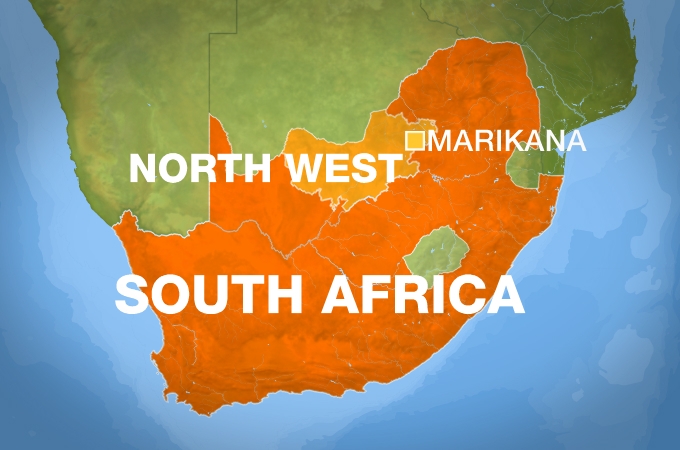South Africa miners set to be freed
Release expected following decision to drop murder charges against 270 workers over deaths of colleagues.

A South African court is due to start releasing 270 miners who were arrested after police gunned down 34 of their colleagues last month.
The first group of miners to be released began arriving at the courthouse in Ga-Rankuwa near Pretoria on Monday, after the public prosecutor on Sunday provisionally dropped murder charges brought against them for the killings by police at platinum giant Lonmin’s Marikana mine.
Keep reading
list of 4 itemsAre seed-sowing drones the answer to global deforestation?
Rainfall set to help crews battling wildfire near Canada’s Fort McMurray
The Alabama town living and dying in the shadow of chemical plants
Murder had been added to the chargesheet against the miners last week, after they were originally charged with public violence, illegal gathering and attempted murder.
“The murder charge against the current 270 suspects, which was provisional anyway, will be formally withdrawn provisionally in court on their next court appearance,” Nomgcobo Jiba, acting national director of prosecutions, announced on Sunday.
Jiba said other charges, including public violence, would remain.
 |
“[The miners] will all have their time in court to be processed and there will be 140 of them so we expect it may take a little bit of time, and then they will be free to go,” Al Jazeera’s Tania Page reported from Ga-Rankuwa on Monday.
“They are going to be released with a warning. And it’s going to be several more months, not until after the commission of inquiry, that they will find out what the final charges are that will be laid against them.
“On Thursday the remainder of that group of miners still in custody are to be released as well once the police are satisfied that they have verified all their details and addresses,” she said.
National Prosecuting Authority spokeswoman Bulelwa Makeke said that police had by Saturday verified the addresses of 140 of the detainees – a prerequisite for releasing them.
The August 16 shootings by police at the mine northwest of Johannesburg killed 34 miners and wounded 78 others in the worst display of state violence since apartheid ended in 1994.
The 270 miners were arrested and charged shortly after the incident. South Africa’s President Jacob Zuma also announced the launch of a commission of inquiry to determine what had taken place at Marikana.
Sunday’s announcement followed a barrage of criticism from political parties, trade unions, civil society and legal experts.
Lawyers for the mineworkers have also argued that their detention is unlawful, and demanded their release in an open letter to President Zuma.
Strikes spread
Meanwhile on Monday, at the Gold One gold mine in Springs near Johannesburg, four miners were shot and injured, apparently by security guards using rubber bullets, police said.
Police spokeswoman Pinky Tsinyane said that authorities had arrested four people for public violence.
|
Journalist Greg Marinovich talks to Al Jazeera about the Marikana mine shootings |
This comes as a strike at Gold Fields’ KDC, another gold mine, is likely to continue.
“The situation is complicated,” said Al Jazeera’s Haru Mutasa, reporting from the site of the strike.”Some employees wanted a salary increase to $1,500 per month, and some political players are trying to capitalise on this crisis.”
“A strike in the gold sector would have a bad effect on the economy, in one of the world’s biggest gold producers … It’s worrying investors both in the country and abroad.”
The first shift of the week began on Sunday night. Around 12,000 workers went on strike on Wednesday night last week.
“We don’t produce over the weekend,” Sven Lunsche, Gold Fields spokesman, said on Sunday afternoon. “From our understanding, [the strike] has not been resolved yet.”
Two night shifts and two day shifts were initially lost, including Friday, according to a statement issued on Friday.
It appeared that a core group of between 1,000 and 2,000 workers had been preventing their colleagues from going to work, Lunsche said.
The Association of Mineworkers and Construction Union (AMCU) was not involved in the strike, he said.
AMCU has been blamed for illegal strikes in the platinum sector, including at the Marikana mine, where a total of 44 people were killed last month.
Peter Turner, Gold Fields’ South African head, said on Friday the strike appeared to be the result of disagreements within organised labour.
“Based on informal feedback from employees, the strike appears to be related mainly to disagreements within organised labour and related structures on the mine, although we cannot confirm this,” he said.
“We appeal to all stakeholders to continue to act with restraint and to find peaceful solutions to their differences.”